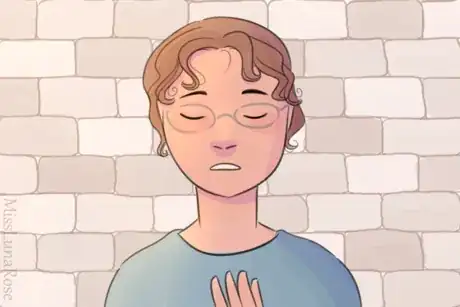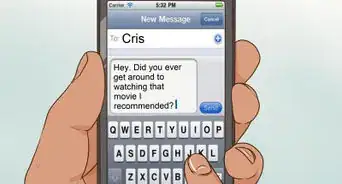This article was co-authored by Sabrina Grover, LMSW. Sabrina Grover, LMSW is a Licensed Master Social Worker (LMSW) who earned her degree in Advanced Clinical Practice from New York University. Sabrina has experience working in substance abuse recovery centers and schools where she gained experience providing evidence-based treatment to children, adolescents, adults, and families. Sabrina specializes in Dialectical, Narrative, and Cognitive Behavioral Therapies. She has particular expertise in treating clients struggling with grief, complex trauma, interpersonal difficulty, family conflict, anxiety, and depression. She commits to providing a supportive environment for everyone who commits to growth and offering a warm, non-judgmental atmosphere.
wikiHow marks an article as reader-approved once it receives enough positive feedback. In this case, 80% of readers who voted found the article helpful, earning it our reader-approved status.
This article has been viewed 55,775 times.
Can you use rejection and its humiliating feelings to become successful, or to get strong? If fear of rejection hampers your choices, then the Rejection Therapy Game may be your answer. Shying away from emotionally painful situations is natural, but if you find that it's restricting your life, it might be time to try a little rejection.
Steps
-
1Write requests on index cards. You should be able to ask these questions, either to someone you know or to a stranger, and accept "no" for an answer. Write requests that you are likely to be turned down for, so that you can win more quickly. Here are some examples:
- A good discount on purchases of services or products
- Sell something to them for a rather high price
- Play a sports game in a stranger's yard
- Take a picture with a person (for no reason)
- Piece of chewing gum
- Ride in their car
- Get a date
- Phone number
Tip: It should only be something you're okay with actually doing. For example, don't ask someone out unless you're good with the answer being yes.
-
2Grab a card and try to get rejected. Ask for something that you expect to be turned down for, because if the answer is "yes," it doesn't count. In order to win the 30-Day Challenge, you must experience at least 1 rejection per day for 30 days.
- If someone says yes, it means you haven't won yet! Grab another card or find a different person to ask.
- If someone says no, you won! Nod graciously, accept the answer, and walk away in triumph.
Advertisement -
3Be considerate and polite with your requests. Be conscious of the other person's boundaries, and make it clear that this is a casual request (with no pressure).
- Keep all your requests and comments respectful of the other person's body. Don't say anything sexual or rude about their appearance.
- Take no for an answer. If the person says no, say "okay," shrug your shoulders, and walk away.
- Recognize that some people have a very strong sense of stranger danger (particularly more vulnerable groups, such as women and disabled people). If the person seems too uncomfortable, apologize and leave.
-
4Start small. Try holding a practice session by explaining the game to a family member, and having them reject a request. Then move on to the request that feels least stressful to you (for example, maybe you want to ask your dad to let you sit shotgun today).
-
5Cope with the no. This may be difficult if you are usually afraid of rejection. Give yourself a little extra pampering and remind yourself that it's okay. It will get easier with practice. As you improve, you will begin to get used to strange looks, rude comments from grumpy people, and outright dismissal of everything you're "trying" to achieve.
- Rejection can actually be a good thing. If someone rejects you or your request, it wasn't a good fit anyway. Think of rejection as a gift and a catalyst for you to get into a better situation where you are accepted and successful.
-
6Recognize what you have to gain. Rejection therapy can help you become braver and more emotionally resilient, because you will become better able to handle a "no." The official website defines the "Five Objectives of The Rejection Therapy Game" as:
- Be more aware of how irrational social fears control and restrict our lives
- Smash the tyranny of fear and reap the treasures (treasures include wealth, relationships and self-confidence)
- Learn from, and even enjoy each and every new rejection
- Do not be attached to outcomes, especially when it involves the free agency of other people
- Permit yourself to fail
-
7Keep practicing. Use and reuse your questions, on different people, one by one. Watch yourself become a stronger, braver person. By hearing enough "nos," you'll learn to make more requests about things that actually matter to you, which will sooner or later lead to hearing "yes."
Warnings
- Don't ask a question if you aren't prepared for a "yes." Sometimes people may surprise you. For example, don't ask someone for a date if you aren't willing to go on a date with them, and don't offer to sell something to someone if you aren't willing to part with it.⧼thumbs_response⧽
References
- ↑ freenew.net -- Android app or Compatible with iPhone, iPod touch, and iPad. Said to be for Android requiring iOS 3.0 or later
- http://rejectiontherapy.com/ - Research source and source of an optional set of cards.





































































